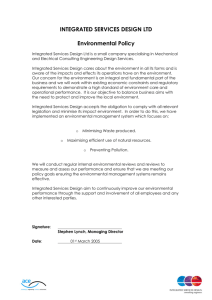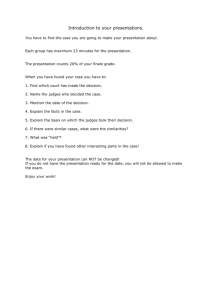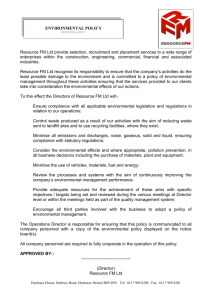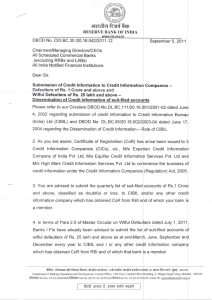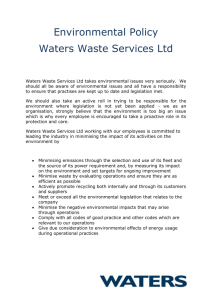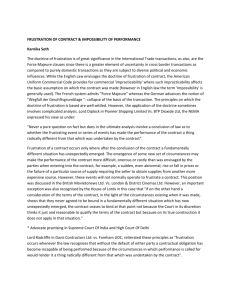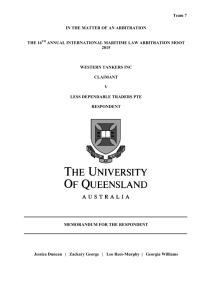Webfile_-_Gulf_and_S..
advertisement
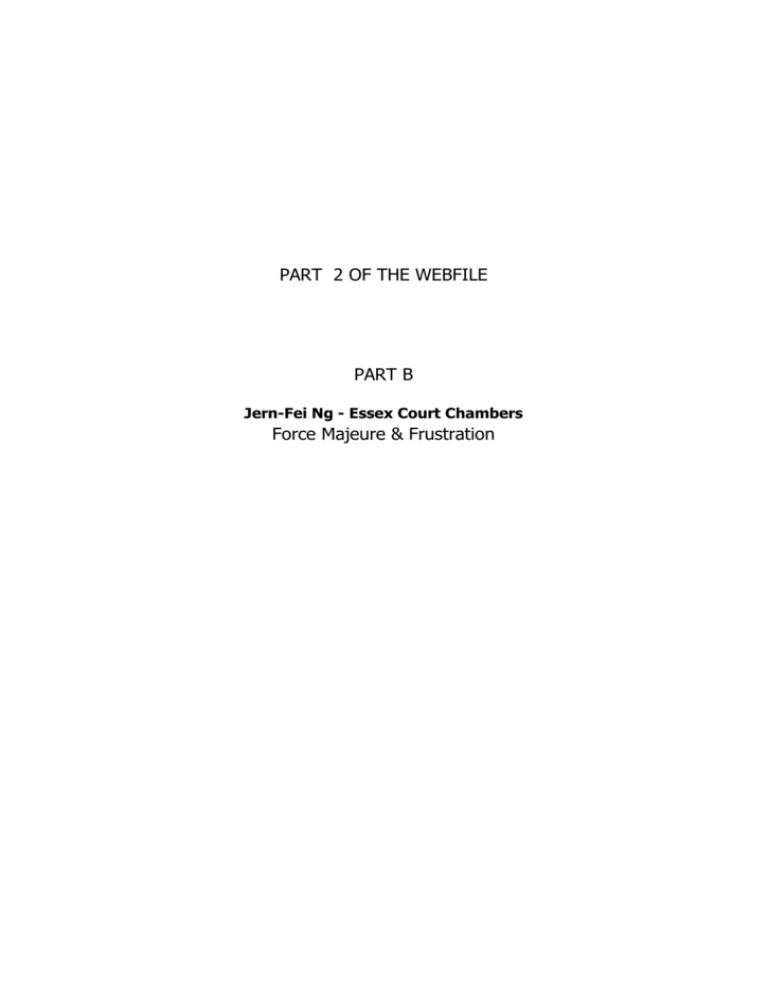
PART 2 OF THE WEBFILE PART B Jern-Fei Ng - Essex Court Chambers Force Majeure & Frustration Force majeure & Frustration © Jern-Fei Ng JERN-FEI NG ESSEX COURT CHAMBERS jfng@essexcourt.net Burden of proof © Jern-Fei Ng Burden of proof • Burden of proof is on party relying on frustration • Burden of proof is on party relying on force majeure: – the situation falls within the ambit of the relevant clause and that his non-performance was due to circumstances beyond his control – that he had taken all reasonable steps to avoid the operation of the force majeure event or mitigate the results therefrom © Jern-Fei Ng Channel Island Ferries Ltd v Sealink UK Ltd [1988] 1 Lloyd’s Rep 323, 327 (per Parker LJ) “It is important in my view to bear in mind: (1) that it is for the party relying on a force majeure clause to bring himself squarely within that clause; (2) that in most cases that can only be done by showing either legal or physical impossibility… (4) a party must not only bring himself within the clause but must show that he has taken all reasonable steps to avoid its operation, or mitigate its results…” © Jern-Fei Ng Frustration © Jern-Fei Ng Davis Contractors Ltd v Fareham Urban District Council [1956] AC 696, 729 • Circumstances in which performance would be radically different from that which was undertaken by the contract • Not hardship or inconvenience or material loss itself which calls the principle of frustration into play © Jern-Fei Ng National Carriers Ltd v Panalpina (Northern) Ltd [1981] AC 675, 700 • Supervening event without default of either party • Which so significantly changes the nature of outstanding contractual rights and/or obligations • From what the parties could reasonably have contemplated at time of execution of contract © Jern-Fei Ng ECONOMIC HARDSHIP/ INCONVENIENCE © Jern-Fei Ng © Jern-Fei Ng ECONOMIC HARDSHIP/ INCONVENIENCE • Palmco Shipping Inc v Continental Ore Corp (The Captain George K) [1970] 2 Lloyd’s Rep 21, 32 • Treitel at p.937: “In England, dicta to the effect that a contract may be discharged if its performance becomes ‘impracticable’ are occasionally found in the cases. But the weight of English authority rejects this view.” • Anson’s Law of Contract at pp.481-482 • Benjamin’s Sale of Goods © Jern-Fei Ng Thames Valley Power Ltd v Total Gas & Power Ltd [2006] 1 Lloyd’s Rep 441 © Jern-Fei Ng Thames Valley Power Ltd v Total Gas & Power Ltd [2006] 1 Lloyd’s Rep 441 • Ultimately a matter of construction. • However, as a matter of principle, courts will not allow a party to be excused from performance on grounds that performance has become more expensive. • “The fact that it is much more expensive, even very greatly more expensive for [Total] to do so, does not mean that it cannot do so.” © Jern-Fei Ng Thames Valley Power Ltd v Total Gas & Power Ltd [2006] 1 Lloyd’s Rep 441 • Performance not excused merely because it has become“commercially unacceptable” or “commercially impracticable”. • This is so even if performance has become “very greatly more expensive”. • Consistent with a line of cases, both on force majeure clauses and on frustration, e.g. Tennants (Lancashire) Ltd v CS Wilson & Co Ltd [1917] AC 495, 510 (per Lord Loreburn). © Jern-Fei Ng “Hardship” clauses? © Jern-Fei Ng “HARDSHIP” CLAUSES • Superior Overseas Development Corp v British Gas Corp [1982] 1 Lloyd’s Rep 262 • Wates Ltd v GLC (1983) 25 BLR 1 © Jern-Fei Ng CTI Group Inc v Transclear SA (The Mary Nour) [2008] 2 Lloyd’s Rep 256 © Jern-Fei Ng The Mary Nour • “23. [I]n the absence of some exceptional supervening event … a contract will not be frustrated simply by a failure on the part of the ultimate supplier to make goods available for delivery…” • “…implicit in a contract of this kind that the seller will either supply the goods himself or (more likely) will make arrangements, directly or indirectly, for the goods to be supplied by others.” © Jern-Fei Ng The Mary Nour • “In other words, he undertakes a personal obligation to procure the delivery of contractual goods and thereby takes the risk of his supplier’s failure to perform…” • 27. [T]he fact that a supplier chooses not to make goods available for shipment, thus rendering performance by the seller impossible, is not of itself sufficient to frustrate a contract of this kind.” © Jern-Fei Ng © Jern-Fei Ng Specified charter routes The Eugenia [1963] 2 Lloyd’s Rep 155, 174 “If, by the express or implied terms of a charterparty, the parties have agreed that a particular route, and that route only, is to be followed, then, if the vessel is, in the commercial sense, prevented from using that route, it may not be necessary for the court to consider whether any other route was commercially practicable. The contractual obligation can be performed only by a particular route which the parties have defined and agreed.” © Jern-Fei Ng Substitution of Charters © Jern-Fei Ng Substitution of Charters • Niarchos v Shell Tankers (The World Sky) [1961] 2 Lloyd’s Rep 496 • Terkol Rederierne v Petroleo Brasileiro SA (The Badagry) [1985] 1 Lloyd’s Rep 395 © Jern-Fei Ng CONCLUSION © Jern-Fei Ng

